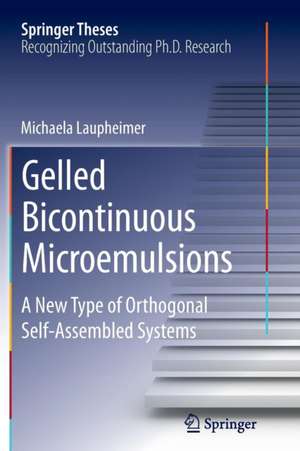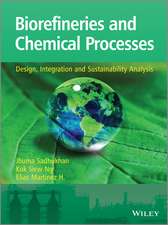Gelled Bicontinuous Microemulsions: A New Type of Orthogonal Self-Assembled Systems: Springer Theses
Autor Michaela Laupheimeren Limba Engleză Paperback – 10 sep 2016
| Toate formatele și edițiile | Preț | Express |
|---|---|---|
| Paperback (1) | 381.81 lei 6-8 săpt. | |
| Springer International Publishing – 10 sep 2016 | 381.81 lei 6-8 săpt. | |
| Hardback (1) | 388.90 lei 6-8 săpt. | |
| Springer International Publishing – 8 iul 2014 | 388.90 lei 6-8 săpt. |
Din seria Springer Theses
- 18%
 Preț: 997.88 lei
Preț: 997.88 lei -
 Preț: 389.88 lei
Preț: 389.88 lei - 15%
 Preț: 646.94 lei
Preț: 646.94 lei - 18%
 Preț: 943.43 lei
Preț: 943.43 lei -
 Preț: 399.29 lei
Preț: 399.29 lei - 18%
 Preț: 944.99 lei
Preț: 944.99 lei - 15%
 Preț: 636.80 lei
Preț: 636.80 lei - 18%
 Preț: 941.05 lei
Preț: 941.05 lei - 15%
 Preț: 643.16 lei
Preț: 643.16 lei - 15%
 Preț: 642.68 lei
Preț: 642.68 lei - 18%
 Preț: 1103.62 lei
Preț: 1103.62 lei - 20%
 Preț: 558.82 lei
Preț: 558.82 lei - 18%
 Preț: 1112.30 lei
Preț: 1112.30 lei - 18%
 Preț: 944.19 lei
Preț: 944.19 lei - 18%
 Preț: 1109.92 lei
Preț: 1109.92 lei - 18%
 Preț: 1217.27 lei
Preț: 1217.27 lei - 15%
 Preț: 640.06 lei
Preț: 640.06 lei - 15%
 Preț: 636.45 lei
Preț: 636.45 lei - 15%
 Preț: 640.06 lei
Preț: 640.06 lei - 15%
 Preț: 640.88 lei
Preț: 640.88 lei -
 Preț: 389.70 lei
Preț: 389.70 lei - 20%
 Preț: 563.89 lei
Preț: 563.89 lei -
 Preț: 393.35 lei
Preț: 393.35 lei - 15%
 Preț: 637.93 lei
Preț: 637.93 lei - 15%
 Preț: 641.85 lei
Preț: 641.85 lei - 18%
 Preț: 1225.94 lei
Preț: 1225.94 lei - 20%
 Preț: 551.36 lei
Preț: 551.36 lei - 18%
 Preț: 1229.10 lei
Preț: 1229.10 lei - 15%
 Preț: 639.25 lei
Preț: 639.25 lei - 18%
 Preț: 999.45 lei
Preț: 999.45 lei - 15%
 Preț: 640.06 lei
Preț: 640.06 lei - 18%
 Preț: 1220.45 lei
Preț: 1220.45 lei - 18%
 Preț: 1116.26 lei
Preț: 1116.26 lei - 18%
 Preț: 1110.72 lei
Preț: 1110.72 lei - 18%
 Preț: 1000.87 lei
Preț: 1000.87 lei - 18%
 Preț: 891.17 lei
Preț: 891.17 lei - 15%
 Preț: 640.06 lei
Preț: 640.06 lei - 5%
 Preț: 1154.07 lei
Preț: 1154.07 lei - 15%
 Preț: 635.96 lei
Preț: 635.96 lei - 15%
 Preț: 640.88 lei
Preț: 640.88 lei -
 Preț: 387.20 lei
Preț: 387.20 lei - 18%
 Preț: 1109.92 lei
Preț: 1109.92 lei -
 Preț: 385.25 lei
Preț: 385.25 lei -
 Preț: 385.25 lei
Preț: 385.25 lei - 18%
 Preț: 1112.30 lei
Preț: 1112.30 lei - 18%
 Preț: 999.45 lei
Preț: 999.45 lei -
 Preț: 386.99 lei
Preț: 386.99 lei - 15%
 Preț: 637.13 lei
Preț: 637.13 lei - 20%
 Preț: 554.20 lei
Preț: 554.20 lei - 20%
 Preț: 555.57 lei
Preț: 555.57 lei
Preț: 381.81 lei
Nou
Puncte Express: 573
Preț estimativ în valută:
73.07€ • 75.48$ • 60.81£
73.07€ • 75.48$ • 60.81£
Carte tipărită la comandă
Livrare economică 25 martie-08 aprilie
Preluare comenzi: 021 569.72.76
Specificații
ISBN-13: 9783319362076
ISBN-10: 3319362070
Pagini: 182
Ilustrații: XXI, 161 p. 81 illus., 35 illus. in color.
Dimensiuni: 155 x 235 x 10 mm
Greutate: 0.27 kg
Ediția:Softcover reprint of the original 1st ed. 2014
Editura: Springer International Publishing
Colecția Springer
Seria Springer Theses
Locul publicării:Cham, Switzerland
ISBN-10: 3319362070
Pagini: 182
Ilustrații: XXI, 161 p. 81 illus., 35 illus. in color.
Dimensiuni: 155 x 235 x 10 mm
Greutate: 0.27 kg
Ediția:Softcover reprint of the original 1st ed. 2014
Editura: Springer International Publishing
Colecția Springer
Seria Springer Theses
Locul publicării:Cham, Switzerland
Cuprins
Introduction.- Theoretical Background.- Phase Behaviour and Rheology of Gelled Microemulsions.- Microstructure of Gelled Bicontinuous Microemulsions.- Conclusions and Outlook.- Experimental Methods.
Notă biografică
Michaela Laupheimer studied chemistry at the University of Stuttgart, Germany, with a focus on technical and physical chemistry. From August 2008 to January 2009 she did an internship at the Robert Bosch LLC Research and Technology Center in Palo Alto, USA, after which she finished her studies and received her diploma in March 2010. Working at the Institute of Physical Chemistry of the University of Stuttgart in the group of Prof. Dr. Cosima Stubenrauch she then studied gelled bicontinuous microemulsions for her PhD thesis, which she defended successfully in November 2013.
Textul de pe ultima copertă
Microemulsions and gels are well-known systems, which play a major role in colloidal and interfacial science. In contrast, the concept of gel microemulsions is still quite new. Gelled microemulsions are highly promising for microemulsion applications in which low viscosity is undesirable, such as administering a drug-delivering microemulsion to a certain area of the skin. It is essential to understand the properties of and structures formed in a system combining microemulsion components and a gelator.
This PhD thesis by Michaela Laupheimer provides an in-depth discussion of the phase behavior and sol-gel transition of a microemulsion gelled by a low molecular weight gelator as well as the rheological behavior of a gelled bicontinuous microemulsion. Moreover, the microstructure of the gelled bicontinuous system is fully clarified using techniques like self-diffusion NMR and small angle neutron scattering (SANS). By comparing gelled bicontinuous microemulsions with corresponding non-gelled microemulsions and binary gels, it is demonstrated that bicontinuous microemulsion domains coexist with a gelator network and that the coexisting structures possess no fundamental mutual influence. Hence, gelled bicontinuous microemulsions have been identified as a new type of orthogonal self-assembled system.
This PhD thesis by Michaela Laupheimer provides an in-depth discussion of the phase behavior and sol-gel transition of a microemulsion gelled by a low molecular weight gelator as well as the rheological behavior of a gelled bicontinuous microemulsion. Moreover, the microstructure of the gelled bicontinuous system is fully clarified using techniques like self-diffusion NMR and small angle neutron scattering (SANS). By comparing gelled bicontinuous microemulsions with corresponding non-gelled microemulsions and binary gels, it is demonstrated that bicontinuous microemulsion domains coexist with a gelator network and that the coexisting structures possess no fundamental mutual influence. Hence, gelled bicontinuous microemulsions have been identified as a new type of orthogonal self-assembled system.
Caracteristici
Nominated as an Outstanding Ph.D. thesis by the University of Stuttgart, Germany Systematic study of properties and structure of a gelled bicontinuous microemulsion Thorough investigation of a novel orthogonal self-assembled system Important basis for future applications of gelled microemulsions Includes supplementary material: sn.pub/extras



